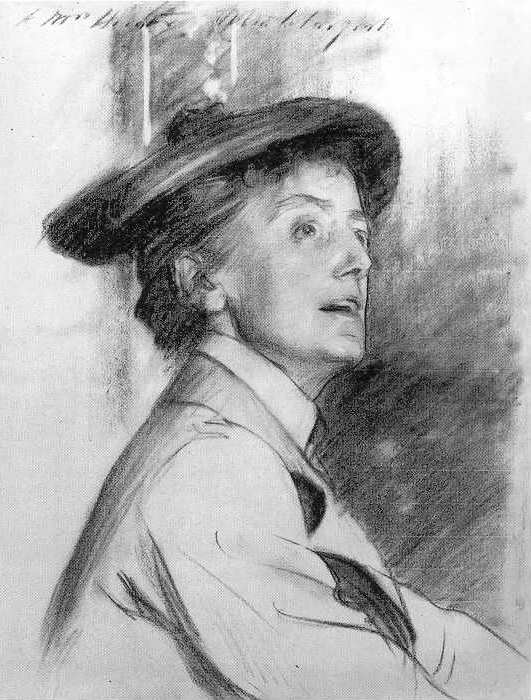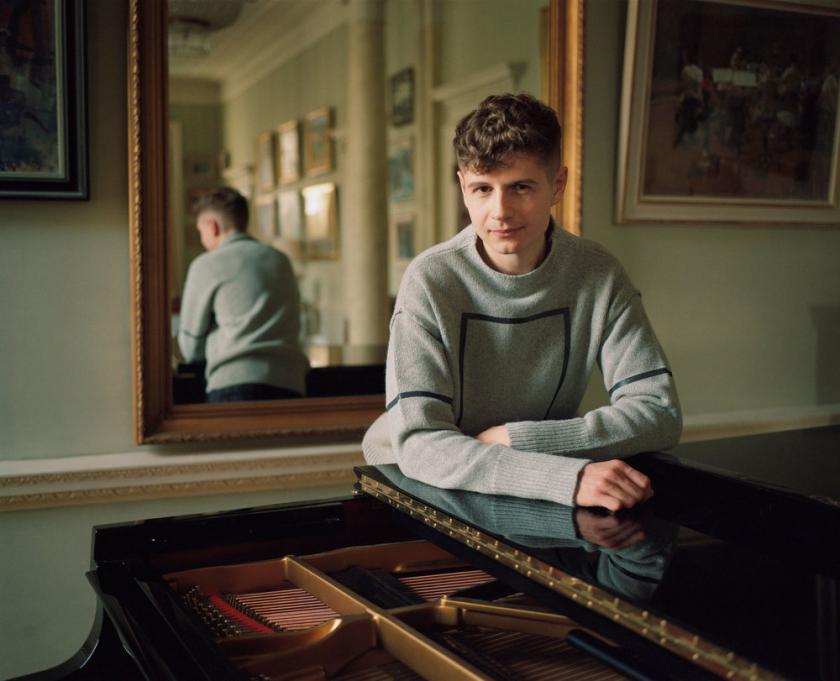Forget the latest International Tchaikovsky Competition winner (I almost have; only a dim memory of Dmitry Masleev's playing the notes in the obligatory First Piano Concerto, and nothing else, remains from an Istanbul performance). Had Pavel Kolesnikov been competing and given a performance like the one he did last night, there'd have been a riot had he not won. This was all about space, intelligent rethinking, imagination, an apparent ease and surface calm in the most daunting passages: a very hard act to follow, and the resurrection of Ethel Smyth's D major Mass after the interval wasn't the answer.
Let's get that ostensible reason for anticipatory excitement in a wildly unbalanced evening over first. The connection is that Tchaikovsky proclaimed the 30-year-old Smyth (pictured below by Singer Sargent) a composer of promise when he met her in Leipzig in 1888. She was also a magnificent voice for suffragism, the 1918 victory of which we celebrate this year, and one of many women composers of the late 19th and early 20th centuries in whom there's interest in putting on a pedestal with the best we have today (her LGBT credentials, as well as any detail on why we should admire this work, were passed over in the programme). The BBC Symphony Orchestra's chief conductor Sakari Oramo, who should have been conducting this concert, fervently believes in the Mass – composed in 1891, overhauled in 1924 – but if there's a strong case to be made for it, replacement Martyn Brabbins missed the mark.
Is the work really as foursquare, at least in the dutiful choral writing, as the performance suggested? The BBC Symphony Chorus, celebrating its 90th anniversary, sounded resplendent en masse, but the tentative entries of individual parts didn't inspire confidence (why on earth mix up the tenors and basses, who need the most help in terms of solidarity, with sopranos and altos?) It was wise, though, to end with the conventionally rollicking Gloria rather than the pallid Agnus Dei.
 The mostly penny-plain block orchestration needs relieving more often, though there were seraphic sounds around the soprano's two major solos, and even one complementary oboe line which made a gambit for individuality. Yet a best-of-British-trained team of soloists – Lucy Crowe, Catriona Morison, Ben Johnson and Duncan Rock – sounded only fitfully at ease. Is Smyth's vocal writing as awkward as it sounded? Jury's out on that one, but I'm not going along to another performance to find out.
The mostly penny-plain block orchestration needs relieving more often, though there were seraphic sounds around the soprano's two major solos, and even one complementary oboe line which made a gambit for individuality. Yet a best-of-British-trained team of soloists – Lucy Crowe, Catriona Morison, Ben Johnson and Duncan Rock – sounded only fitfully at ease. Is Smyth's vocal writing as awkward as it sounded? Jury's out on that one, but I'm not going along to another performance to find out.
Back, then, to a work of chameleonic mastery, though this Tchaikovsky First Piano Concerto wasn't quite the one most of us know and love. This revised version published in 1879, the last over which Tchaikovsky had a say, begins not with grandiose piano chords accompanying the big tune but relatively delicate arpeggiations, and there's an extra passage later excised from the finale which no-one would miss that much, though it does give a bit of extra scale to a short movement.
The main point is that the delicacy of the soloist's first entry was fulfilled in the more introspective playing of Kolesnikov's radically fresh and individual performance. After the famous melody has done its introductory work, never to return, he inscaped the transition to more fluid invention, stamping the ferocious double octaves at the bravura end of the scale with striking personality. If the orchestra as a whole felt more solid than the pianist's volatile surprises, Daniel Pailthorpe's flute solos were equal to his exquisite imagination. When Kolesnikov changes face, he never draws attention to the way he does it: the scherzoid transformation of the exquisite Andantino semplice simply happened with sleight of hand before you had time to notice the new, prestissimo tour de force.
Kolesnikov had previously set his seal on Tchaikovsky interpretation with a recording of The Seasons and an equally stupendous Proms performance of the Second Piano Concerto with the National Youth Orchestra of Scotland; if anyone can champion the quirky and delightful Concert Fantasia, it's him, so that next, please. Here his art-concealing-art response to the wild applause at the end was the tiny gem of Chopin's posthumously-published E flat major waltz. That's where the concert ends in my mind, but the BBCSO and Brabbins have a chance to redeem the damp squib of the Smyth Mass with outstanding contemporary composer Cheryl Frances-Hoad's new work commemorating the First World War in a fortnight's time.













Add comment